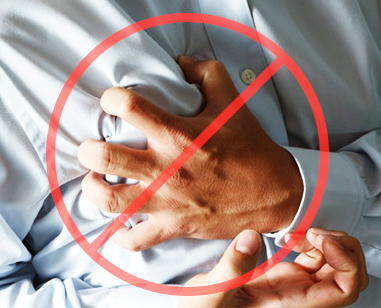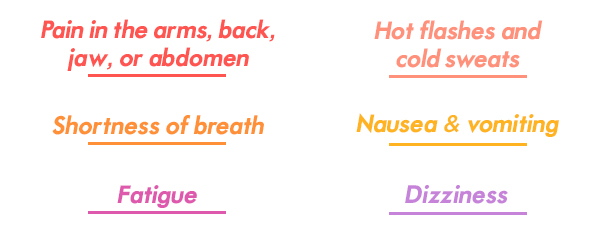
When she was 50 years old, Rosie O’Donnell left a medical appointment with her wife, who was undergoing treatment for cancer. As they left the hospital, the two of them helped lift a morbidly obese woman who’d become stuck in her car. Upon returning home with her wife, Rosie felt “as though a bear had grabbed both of my arms and ripped out the muscle.”
They hurt, but the pain wasn’t radiating into her chest,
neck, or jaw.
Rosie actually visited her therapist at first, thinking she was having a physical reaction to the emotional distress of helping the overweight woman. She’d identified with the woman because, as she says in “A Heartfelt Stand Up,” which aired on HBO in February, “I understand the shame of being overweight in America.” Rosie is not alone, since obesity is one of the top issues facing America. Her therapist sent her home, thinking that Rosie was having a panic attack. Instead, she was having a heart attack, and it almost killed her.
Women Have Different Heart Attack Symptoms

Rosie’s symptoms didn’t create a typical Hollywood “grab your chest and collapse” drama. When she returned from her therapist’s office, she felt intensely hot, hotter than she’d felt when she had hot flashes during menopause. After vomiting and feeling overwhelmed by exhaustion, she searched Google for heart attack symptoms. When she finally saw a cardiologist that evening, she had a blockage in her left descending artery, or LAD, a type of heart attack that cardiologists refer to as “the widowmaker.”
Chest pain is the number one symptom that men feel during a heart attack, but Rosie, like many women, didn’t feel a significant amount of chest discomfort. She did have some of these symptoms, which are common for women experiencing heart attacks:

Like 75 to 80 percent of women in the midst of a heart attack, Rosie didn’t seek immediate medical attention.
In fact, instead of going to the doctor, she swallowed an aspirin. Dr. Jay Mathews of Bradenton Cardiology Center in Bradenton, CO, says that women are 28 percent more likely to die of a heart attack because they ignore the symptoms. Also, when women present with vague symptoms, like shortness of breath, fluttering in the chest, and indigestion, doctors often don’t recognize a heart attack in progress.
Know Your Risk Factors
Certain conditions make it more likely that you could have a heart attack. If you have any of these risk factors, Dr. Mathews recommends a regular cardiac vascular screening:
- DIABETES. If you’re overweight or have a history of diabetes in your family, make sure that you never skip your annual physical. Left untreated, diabetes significantly increases your risk of having a heart attack.
- SMOKING. Smoking puts you at risk for heart attack, lung cancer, stroke, and many other dangerous conditions. Stop smoking, and if people in your household regularly expose you to secondhand smoke,
 send them outside to light up.
send them outside to light up. - FAMILY HISTORY. Women who have grandparents, parents, or siblings who’ve had heart attacks before the age of 65 might be at increased risk.
- HIGH BLOOD PRESSURE. Over time, high blood pressure can hasten atherosclerosis, which makes it easier for blockages to form in your coronary arteries.
- PHYSICAL INACTIVITY. Exercise improves your overall cardiovascular health, helps you control your weight, and helps to lower high blood pressure. So get moving—doctors recommend 75 minutes of vigorous physical activity weekly or 150 minutes of moderate activity each week.
Being overweight doesn’t necessarily increase your risk, but it does increase the chance that you’ll develop other risk factors, like diabetes and high blood pressure. Dropping just 10 percent of your body weight can significantly decrease your risk for heart attack and other disorders. When you exercise, use a machine that puts less strain on your joints, like an elliptical machine or stationary bike. You can also try swimming, water aerobics, or Aqua Zumba for a change of pace.

Be Your Own Best Advocate
If you recognize symptoms of a heart attack, and you have any of the risk factors, seek medical attention immediately.
Tell doctors you think you’re having a heart attack, and don’t let them tell you it’s something else. Sticking up for yourself could make the difference between life and death.

